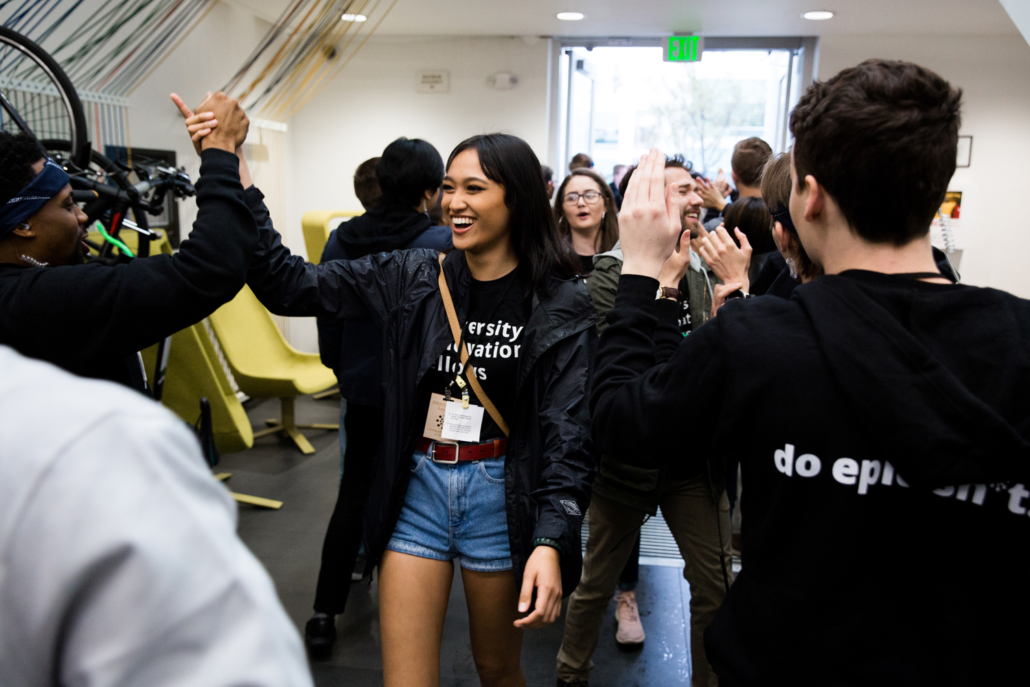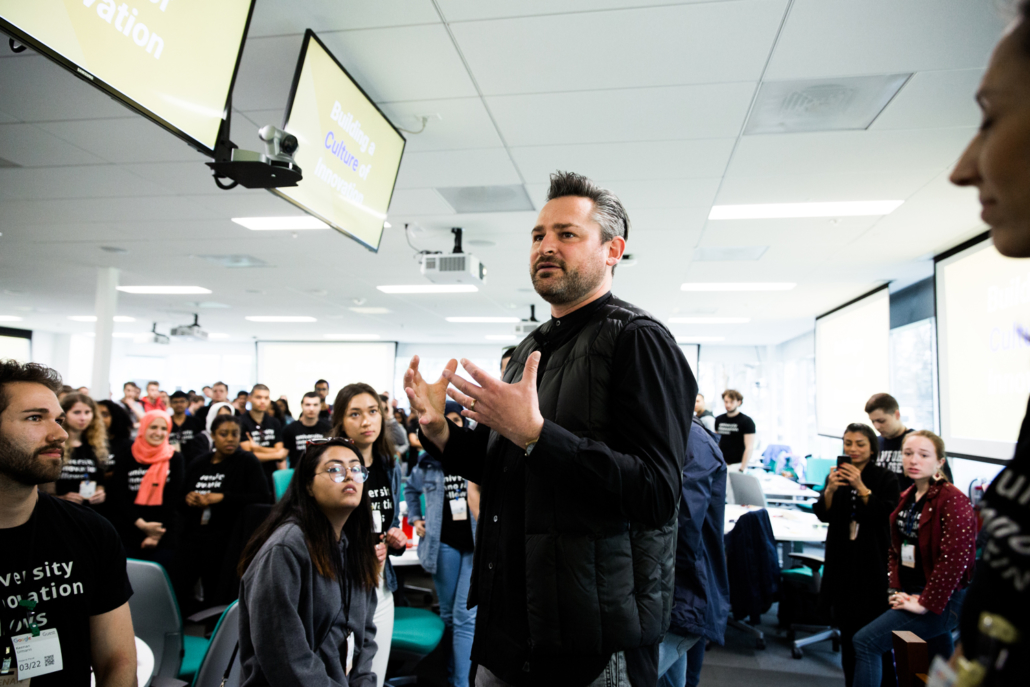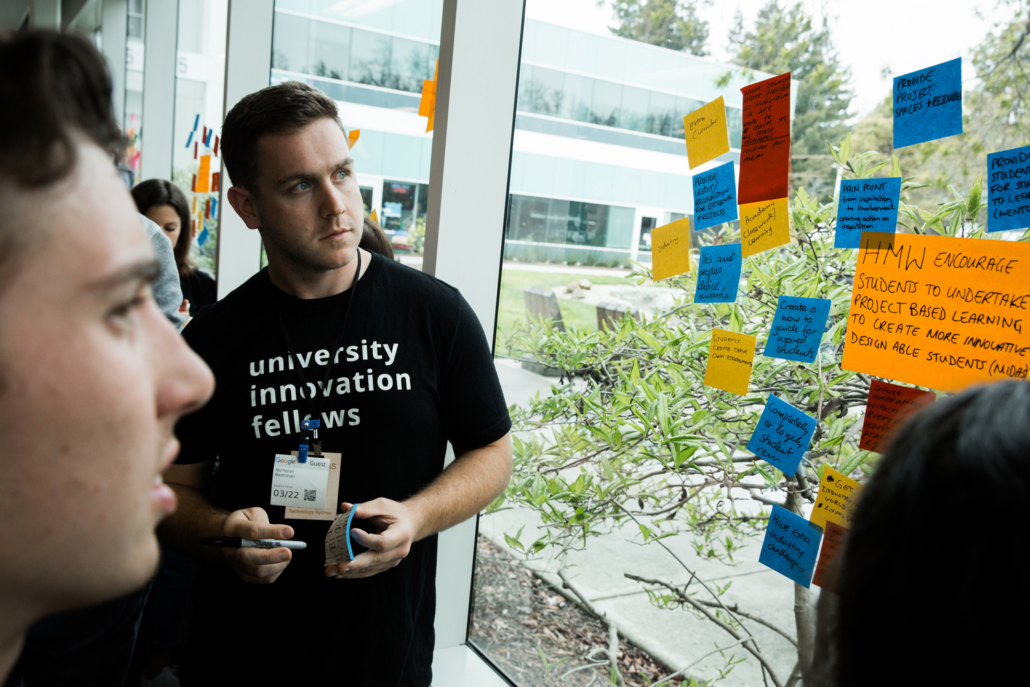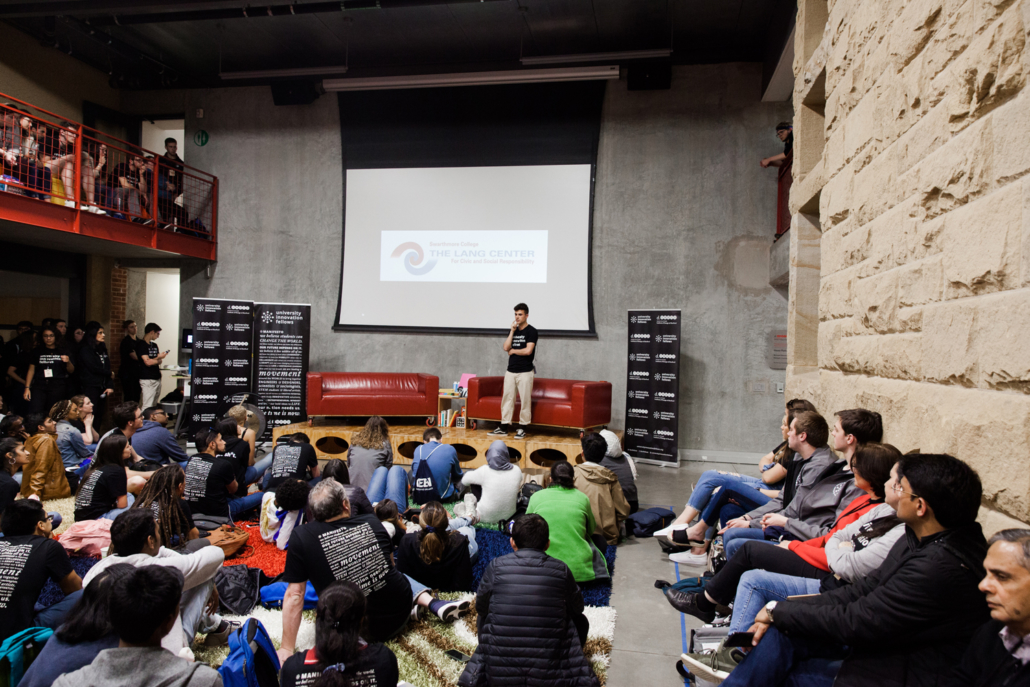Meetup Reflections: Creating Change Together
350 University Innovation Fellows and faculty traveled to the Bay Area for the 2019 Silicon Valley Meetup. Check out the materials and other resources from the Meetup.
Nearly 350 University Innovation Fellows and faculty traveled to the Bay Area for the 2019 Silicon Valley Meetup, March 21-25, to learn new ways to create change in higher education. Our UIF team was thrilled to host so many amazing changemakers at Stanford University and Google for four learning-packed days.
This is the seventh (!) Silicon Valley Meetup we’ve held, and we wanted to try something different for this year’s event blog post. The Meetup wouldn’t be possible without 24 Fellows who served as Fabs (short for “fabulous”). These Fabs were bus team leaders, facilitators, mentors, speakers, event organizers and friends. We asked the Fabs for their reflections on different parts of the Meetup to provide an insider’s look at the action, adventure and learning.
Day 1: The first moments of the Meetup
By Carolina Vassallucci, University of Montevideo
The magic began when the Fellows registered in one of the rooms of the Crowne Plaza Hotel on Thursday afternoon. There were six tables decorated according to different teams that represented superheroes: Avengers, X-Men, Guardians of the Galaxy, Black Panther, The Justice League and Fantastic Four. Each team was represented by four Fabs and had its table decorated according to their superhero team.
When the Fellows entered the room, all the Fabs shouted the name of their group and danced uncontrollably. What was the goal? To spread the energy from the very beginning, while doing simultaneous activities: checking who arrived, and giving them custom name badges, notebooks and UIF stickers. Fabs answered questions regarding dress code and agenda, and fielded comments about the excitement and anxiety for the days that were approaching.
Day 2: Google and a culture of innovation
By Jessica Aldrich, Wichita State University
Standing on the roof of Google helping set up one of the iconic Silicon Valley Meetup photos, I observed the formation of a community of individuals who had only met a few hours prior.
Fellows attending the Meetup spent their first full day at Google where they heard from Frederik Pferdt, the Chief Innovation Evangelist at Google, and were empowered to believe that they were ready to change the world. They were inspired by Daniel Holle from Loon, Ciela Hartanov from The Google School for Leaders, and Reena Jana, Head of Product & Business Inclusion Strategy at Google. They learned to build psychological safety within their teams and this community. After reflecting on the day with the Wichita State University Fellows, they shared with me some profound insights and takeaways:
“Become a leader when necessary, but not always. Be your own person, but work with your team too.”
“As soon as you shift your perspective, you change what you see.”
“Have courage to step into the unknown.”
This cohort of Fellows transformed from unsure about the day ahead (they were greeted with high fives at 8 am) to feeling like a deep community that embraced everyone when the buses rolled off Google campus at the end of the day. They had learned insights from industry leaders, experienced their first round of Fab ignites (short talks about their passions, challenges and activities as Fellows), and developed deep friendships that continued to grow over the rest of the week.
Day 3: Reimagining learning at Stanford
By Sienna George, Boise State University
On Saturday, Fellows experienced what it mean to “reimagine learning” through a day of experiential activities and a culminating unconference. They learned to test their own boundaries of what it means to learn and the potential they have to contribute to the learning landscapes at their own colleges and universities.
Throughout the day, Fellows embraced dance with Aleta Hayes from Stanford as a means by which to cultivate empathy for self-and-other and got inspired to challenge their own comfort zones. They engaged with the concept of space as a catalyst for connection and creativity using the d.school book Make Space as a guide for creating collaborative spaces. They learned public speaking and how to present themselves with confidence from Dan Klein of Stanford. They got “stoked” as they practiced how to reinvigorate mindsets and learned to energize others, and ultimately, embraced their own “true colors,” as they understood their leadership attributes and values, and how to collaborate with others during the “Six Thinking Hats” activity. The day’s culminating unconference presented students with the opportunity to couple their knowledge with an experience to share their own wisdom, demonstrating what it means to truly reimagine learning by contributing their brightest ideas for the future landscape of higher education.
As a Fab, my greatest take-away from the day was watching students transform their mindset from one of “I can’t do that,” or “that’s not for me,” into a mindset of “anything is possible,” and “that’s mine to make the most of,” embodying the spirit of true student agency.
Day 4: Designing for the future
By Sam Warach, University of New Hampshire
Sunday featured several inspirational speakers: Lisa Kay Solomon, designer in residence at the d.school; Alberto Savoia, Co-Founder of Agitar Software and former Google Innovation Agitator, who covered topics such as his concept of “Pretotyping”; Holley Murchison, founder of Oratory Glory, who talked about the importance of your personal brand and story; and Eric Edward Schell of Pride Portraits.
In the morning there were a series of panels featuring Fellows who had graduated and were in the workforce. During this, I had the opportunity to share my journey of growing my own startup NextStep HealthTech, and the launch of our mobile health software product, Hey NextStep. After the panel sessions, Fellows regrouped with members from their home universities to design system changes they would plan to implement upon their return. Students in my workshop group from India decided they were going to create a design club at their home university to cultivate positive change in their community.
In the afternoon, I personally had the honor to deliver a talk called “Take the NextStep: Harness the Power of Tenacity” to the attendees to share my experience as a Fellow working to create impact both in my Alma Mater community at the University of New Hampshire, and in the Behavioral Healthcare Industry after graduation with NextStep HealthTech.
I feel confident to say we will see the emerging leaders who have gone through the University Innovation Fellows program implement solutions to pressing problems, and change the world for the better.
Marvelous Monday adventures
By Vanessa Ganaden, California State University, Fullerton
On Monday morning, participants were given the opportunity to select one of six destinations: Stanford innovation and entrepreneurship (I&E) programs; the Garage at Microsoft Silicon Valley; Sustainable U (Stanford Sustainable Food Program); K-12 education at the Nueva School Innovation Lab; startup culture at Handshake headquarters; and a reflection at the Golden Gate Bridge.
I was a facilitator for the Stanford I&E program adventure. It was a fascinating look into how Stanford promotes I&E in the programs that they offer within the campus. For the first part, we explored how the Stanford Technology Ventures Program (STVP) promotes entrepreneurship within Stanford’s School of Engineering. Then we took a look into how extreme and innovative thinking is being used to create social impact in the world’s poorest countries with the d.school’s “Design for Extreme Affordability” class. After those two programs, we participated in a workshop entitled “Designing with Machine Learning” with a goal to democratize machine learning through the use of design systems to create human-centric solutions.
When we say “innovation and entrepreneurship,” it can be hard to connect with, not because we don’t understand the importance of the topics, but rather it can be challenging to connect them with our real world. Today’s activity showed me and the other Fellows that innovation and entrepreneurship are applied very deeply to the things that we care about, from social issues to new technologies such as machine learning. It also demonstrated that Design Thinking is a universal methodology that can transcend disciplines, technology and cultures to solve problems that change the world.
Lifelong connections
By Trevor Clevenger, Colorado School of Mines
There were hundreds of college students from around the world here for the Meetup. It was so inspiring to see people from such different backgrounds collaborating on how to make their campuses a better place. A lot of the students were noticeably shy at first, but you could tell that everyone opened up substantially as the weekend went on. By the end of the Meetup, real connections were being made that these students can carry with them for the rest of their lives.
What it means to be a Fab
By Jonathan Puhl, University of North Dakota
During our time as Fabs for this year’s Silicon Valley Meetup, we came to understand the true meaning of community. We helped orchestrate, implement, and keep the Meetup running, while helping any faculty or students with their needs. Our role seems to be a combination of facilitator and organizer mixed together.
While doing all the tasks associated with these descriptions, we also give ignite talks to the 350 attendees. Some topics included our questioning whether we are “just” students, overcoming incredible odds, and difficult happenings in our lives. We hope that these talks inspired the attendees do even more incredible things.
One thought we came away with this year wasn’t just that we got to be Fabs at the Meetup, but that through our involvement, we got to help others achieve their goals, simply by being able to tell our story, have a chat, or give them ideas to implement on their campus. This “role” is an amazing experience to bring our UIF skills to a different level and implement our learning through the UIF program and our lives, into a community focused purpose to help others do even greater things.
Life lessons
By Omri Gal, Swarthmore College
I learned how important it is to share your story. You never know who it will affect, and how. By sharing, you are able to connect with others and form deep and meaningful relationships. Working with the other FABs was one of the best experiences I’ve ever had. I have never worked with such an incredible group of people, and it taught me how important it is to surround yourself with empathetic, and caring people.
UIFamily forever!
By Daniel Kleinman, University of Florida, Leidos
Between my parents’ divorce when I was 13 and my dad and grandmother passing away when I was 23, the feeling of being a part of a family unit has not been much of a constant in my life. Feeling like I actually belonged to something (more than just being involved) created this raw, deep sense of connection that was something that I rarely, if ever, had felt in my life.
Being a Fab and part of this UIFamily was not just about feeling the love and support that comes with being surrounded by such amazing people, but truly how humbling it is to know that everyone is there for you on a deeper level, without a shred of doubt. There is certainly a practice of what we preach with empathy, passion, and inspiration for one another. There’s an unspoken confidence in the quality and commitment to these connections that makes them much more than friendships – and that’s when I knew I had found my UIFamily… and now they can’t get rid of me if they tried!





























